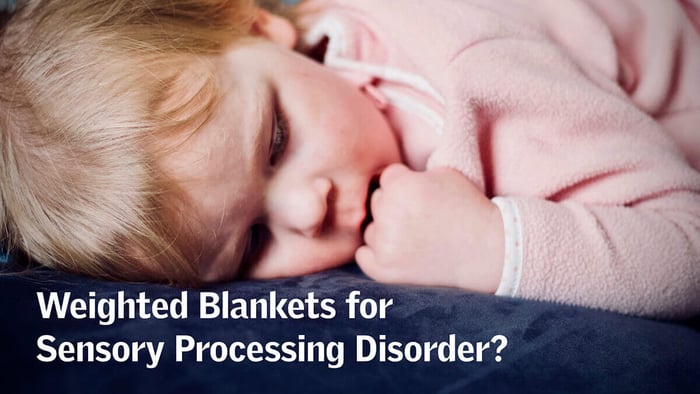Getting restful sleep can be a challenge for all of us from time-to-time, but for children with sensory processing disorder, quality sleep can be even more difficult to achieve. Children who have this condition are especially sensitive to things going on in the environment. For example, they may have extreme difficulty tolerating loud noises, or certain textures or touches may upset them. A child who is sensitive to the feel of sheets or blankets or who finds it stressful to cope with noises in the environment may understandably struggle to settle down for a restful night of sleep. This is where a weighted blanket for sensory processing disorder can help.
- How Weighted Blankets Work
- Sensory Processing Disorder and Sleep
- Weighted Blankets for Sensory Processing Disorder: What Does the Research Say?
- Weighted Blanket for Sensory Issues with Autism
- Better Sleep for Your Child With Sensory Processing Disorder with Aricove
How Weighted Blankets Work
Before learning how weighted blankets for sensory processing disorder are beneficial, it is helpful to understand how weighted blanket therapy works. As experts explain, weighted blankets have a calming effect on the body, as they activate the parasympathetic nervous system, which relaxes the body. They also quiet the activity of the sympathetic nervous system, which goes into overdrive when a person is faced with stress.
Weighted blanket therapy achieves these relaxing effects by applying deep touch pressure to the body. The weight of the blanket has a physiological effect on the nervous system because of deep touch pressure, and it is for this reason that weighted blankets can help children with sensory sensitivities to calm themselves for sleep.
Sensory Processing Disorder and Sleep
Studies concerned with the relationship between sensory sensitivities and sleep problems suggest that weighted blankets for sensory processing disorder may be helpful. In fact, research shows that children with sensory sensitivities can take more time to settle down to sleep at night, which can lead to reduced sleep time. Since weighted blankets have a calming effect on the nervous system, we would expect that they would help children to overcome difficulty settling down for bed.
Additional research has found that even adults with sensory sensitivities can be vulnerable to sleep problems. A weighted blanket for sensory issues may be warranted for both children and adults.
Weighted Blankets for Sensory Processing Disorder: What Does the Research Say?
Given the fact that weighted blankets can relax the nervous system, researchers have taken interest in whether a weighted blanket for sensory issues is effective. So far, the results have been promising. For example, the results of a 2018 study in the American Journal of Occupational Therapy suggest that weighted blankets can help children with sensory sensitivities to calm themselves down to fall asleep, and stay asleep.
A second study, published a year earlier in the same journal, found that some children with sensory sensitivities experienced an improvement in sleep quality when they used a therapeutic weighted blanket. Weighted blanket sensory processing disorder treatment seems to be a viable option for children who struggle with sleep.
Weighted Blanket for Sensory Issues with Autism
Children with sensory processing disorder or sensory sensitivities can benefit from the use of weighted blanket therapy, but weighted blankets for sensory issues can also be therapeutic for children with autism. This is because one of the diagnostic criteria for autism is an overreactivity to sensory information. For example, certain textures may upset a child with this condition.
Fortunately, there is pretty strong evidence that a weighted blanket for sensory processing disorder in autism is effective. A report in an August 2019 publication of the Archives of Clinical Neuropsychology evaluated the results of six different studies that used weighted blanket therapy for autism. The results showed that sleep duration tends to be longer when children with autism use a weighted blanket. For sleep-deprived parents who just want everyone in the family to finally get a good night’s sleep, a weighted blanket for sensory issues just might be the answer.
Better Sleep for Your Child With Sensory Processing Disorder with Aricove
If sensory issues are keeping you and your child up at night, Aricove has a solution for you. We offer weighted blankets for toddlers, which are appropriate for children aged two and above. These five-pound weighted blankets are suitable for toddlers and children with sensory sensitivities, and can help them to get the sleep they need to feel their best.
Our bamboo weighted blanket is the ideal option for a child with sensory processing disorder, as the twill-woven bamboo fabric is soft to the touch and breathable, so as to reduce the risk of aggravating sensory sensitivities or leading to overheating. It is also a good fit for children who have eczema or other skin sensitivities, making Aricove the best weighted blanket for sensory processing disorder.


 United States (USD $)
United States (USD $)